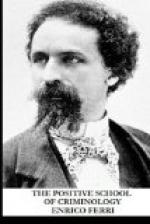“I. In place of penitentiary, imprisonment for not less than six years.
“II. In place of the permanent loss of civic rights, a loss of these rights for a stipulated time.
“III. Whenever it is a question of a penalty of more than twelve years, it is reduced to from three to ten years; if of more than six years, but not more than twelve, it is reduced to from one to five years; in other cases, the reduction is to be one-half of the ordinary penalty.
“IV. A fine is reduced to one-half.
“V. If the penalty would be a restriction of personal liberty, the judge may order the prisoner to a workhouse, until the proper authorities object, when the remainder of the sentence is carried out in the usual manner.”
It is true that there is now and then in those halls of justice, which remain all too frequently closed to the living wave of public sentiment, some more intelligent and serene judge who is touched by this painful understanding of the actual human life. Then he may, under the illogical conditions of penal justice, with its compromise between the exactness of the classic and that of the positive school of criminology, seek for some expedient which may restore him to equanimity.
In 1832, France introduced a penal innovation, which seemed to represent an advance on the field of justice, but which is in reality a denial of justice: The expedient of extenuating circumstances. The judge does not ask for the advice of the court physician in the case of some forlorn criminal, but condemns him without a word of rebuke to society for its complicity. But in order to assuage his own conscience he grants him extenuating circumstances, which seem a concession of justice, but are, in reality, a denial of justice. For you either believe that a man is responsible for his crime, and in that case the concession of extenuating circumstances is a hypocrisy; or you grant them in good faith, and then you admit that the man was in circumstances which reduced his moral responsibility, and thereby the extenuating circumstances become a denial of justice. For if your conviction concerning such circumstances were sincere, you would go to the bottom of them and examine with the light of your understanding all those innumerable conditions which contribute toward those extenuating circumstances. But what are those extenuating circumstances? Family conditions? Take it that a child is left alone by its parents, who are swallowed up in the whirl of modern industry, which overthrows the laws of nature and forbids the necessary rest, because steam engines do not get tired and day work must be followed by night work, so that the setting of the sun is no longer the signal for the laborer to rest, but to begin a new shift of work. Take it that this applies not alone to adults, but also to human beings in the growing stage, whose muscular power may yield some profit for the capitalists. Take it that even the mother, during the period of sacred maternity, becomes a cog in the machinery of industry. And you will understand that the child must grow up, left to its own resources, in the filth of life, and that its history will be inscribed in criminal statistics, which are the shame of our so-called civilization.




